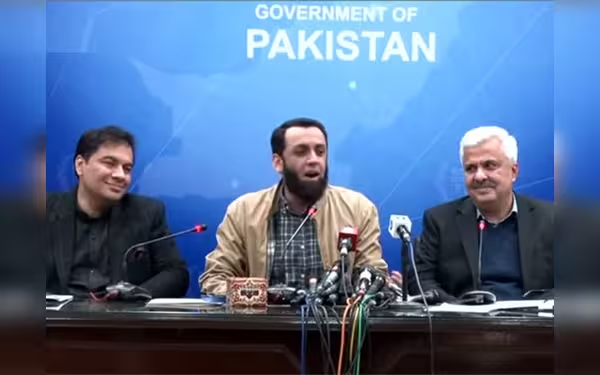Saturday, December 28, 2024 03:08 AM
Tarar Accuses Murad Saeed of Leading Armed Protests in Peshawar
- Tarar alleges Saeed leads armed protesters in Peshawar.
- Claims of foreign involvement complicate protest narrative.
- Government faces scrutiny over media's portrayal of events.
 Image Credits: tribune.com.pk
Image Credits: tribune.com.pkInformation Minister Tarar accuses PTI's Murad Saeed of leading armed protests and hiding in Peshawar's CM House amid rising political tensions.
In recent days, the political landscape in Pakistan has been charged with tension, particularly surrounding the protests that have erupted in the capital. These protests have drawn significant attention, not only from local media but also from international outlets. Amidst this turmoil, Information Minister Tarar has made serious allegations against Murad Saeed, a prominent member of the Pakistan Tehreek-e-Insaf (PTI) party. Tarar claims that Saeed has been leading armed protesters and is currently hiding in the Chief Minister's House in Peshawar.
According to Tarar, Saeed allegedly coordinated a group of armed Afghan nationals and other troublemakers during the recent demonstrations. This assertion raises concerns about the nature of the protests and the individuals involved. The Information Minister's comments suggest that the situation is more complex than it appears, with potential foreign involvement complicating the narrative.
Furthermore, Tarar has vehemently criticized what he describes as false claims propagated by international media regarding the protests. He specifically referred to reports of "killings" during these events, labeling them as part of a smear campaign aimed at discrediting the government. This statement highlights the ongoing struggle between the government and opposition parties, as well as the role of media in shaping public perception.
The allegations made by Tarar against Saeed are serious and could have significant implications for the political climate in Pakistan. If proven true, they could lead to further unrest and a crackdown on dissent. On the other hand, if these claims are unfounded, they could be seen as an attempt to divert attention from the government's own challenges.
As the situation continues to unfold, it is crucial for citizens to remain informed and critically evaluate the information presented to them. The interplay between politics, media, and public opinion is delicate, and understanding the motivations behind various narratives is essential for a well-rounded perspective. In these times of uncertainty, fostering open dialogue and seeking the truth should be the priority for all stakeholders involved.













